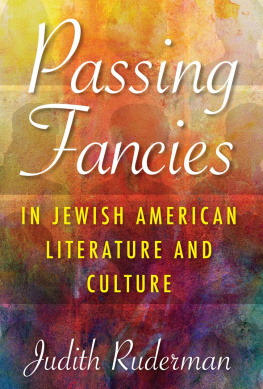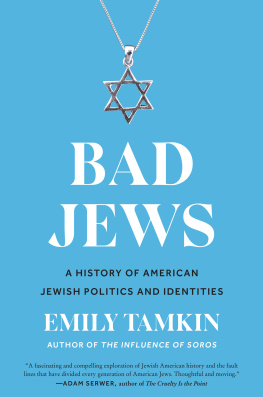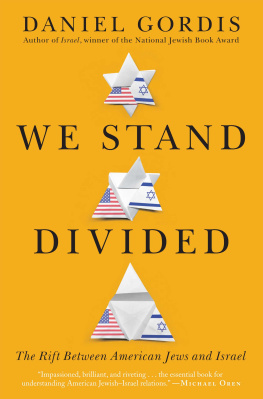Copyright 2010 by Princeton University Press
Published by Princeton University Press, 41 William Street, Princeton, New Jersey 08540 In the United Kingdom: Princeton University Press, 6 Oxford Street, Woodstock, Oxfordshire OX20 1TW
press.princeton.edu
All Rights Reserved
Library of Congress Cataloging-in-Publication Data
Wenger, Beth S., 1963
History lessons : the creation of American Jewish heritage / Beth S. Wenger.
p. cm.
Includes bibliographical references and index.
ISBN 978-0-691-14752-9 (cloth : alk. paper) 1. JewsUnited StatesHistory.
eISBN 978-1-400-83405-1
2. JewsCultural assimilationUnited States. 3. JewsUnited StatesIdentity.
4. United StatesEthnic relations. 5. Salomon, Haym, 17401785. I. Title.
E184.35.W418 2010
973'.04924dc22 2009049446
British Library Cataloging-in-Publication Data is available
R0
ACKNOWLEDGMENTS
During the years that I have worked on this project, I have benefited from the support and good counsel of many friends and colleagues as well as the assistance of several institutions and their staffs. It is truly a pleasure to have the opportunity to acknowledge those who made this book possible.
A fellowship from Yale Universitys Institute for the Advanced Study of Religion in 20002001 allowed me the time to mine the archives and cultivate the seeds that ultimately made this project grow. I am grateful to Jon Butler and Skip Stout, the Institutes directors, for creating a nurturing environment for scholarship. A grant from the University of Pennsylvania Research Foundation also provided support that helped me move forward in the early stages of research. I am particularly indebted to the American Council of Learned Societies for a fellowship in 20067 that enabled me to focus solely on writing. In the 20089 academic year, a Mellon Research Grant from the University of Pennsylvanias Humanities Forum made possible some much-needed relief from teaching, so that I had the time to complete the manuscript. Finally, the Lucius N. Littauer Foundation graciously provided a subvention to Princeton University Press that helped to defray the cost of illustrations.
This book would never have been completed without the capable assistance of knowledgeable archivists and librarians. Lyn Slome, former director of the library and archives at the American Jewish Historical Society (AJHS), answered my many questions, and her familiarity with the collections led me to an array of helpful sources. Tammy Kiter, who recently became the photo archivist at the AJHS, has provided timely assistance and identified useful images. I thank Jesse Aaron Cohen for lending his expertise and guiding me through the YIVO Institutes image collections. As always, Kevin Proffitt, Senior Archivist for Research and Collections at the Jacob Rader Marcus Center of the American Jewish Archives, along with Camille Servizzi, graciously responded to my research questions and image requests at every turn. Pamela Elbe at the National Museum of American Jewish Military History generously gave of her time when I conducted research in Washington, D.C., and offered permission for image reproduction from the Jewish War Veterans collection housed at the AJHS. At Penns Herbert D. Katz Center for Advanced Judaic Studies, librarian Judith Leifer found a way to track down even the most obscure book or journal. Seth Jerchower, former librarian and archivist at the Katz Center, graciously scanned several images that appear in this book, as did Christine Walsh, Administrative Coordinator of Penns Jewish Studies Program. Claire Pingel of the National Museum of American Jewish History helpfully supplied material from the museums collections, and the volunteer staff of the Touro Synagogue Foundation gave of their time to provide materials that I requested.
Many students and colleagues played a role in this books creation. While they were undergraduates at the University of Pennsylvania, Corey Brooks and Eve Mayer conducted research that contributed valuably to this project. I feel extremely fortunate to have met Jordan Schuster, then completing a Masters Degree at Columbia University, who provided critical research assistance during a crucial moment in this books development. His sharp analytic and translation skills have made this a better book. I owe a particular debt to David Lobenstine for his careful reading of the manuscript and thoughtful suggestions for improvement. His attention to detail and focus on the books broader themes, along with his constant encouragement, made it possible for me to complete this project.
So many friends and colleagues contributed in a variety of ways to the production of this book. Conversations with Hasia Diner, Aryeh Goren, Rebecca Kobrin, Pamela Nadell, Gail Reimer, and Jeffrey Shandler provided a sounding board for ideas and always left me with fresh perspectives. Richard Beeman, Benjamin Nathans, and Michael Zuckermanall colleagues of mine at the University of Pennsylvaniagenerously answered specific questions and offered valuable suggestions. Karla Goldman, Paula Hyman, Arthur Kiron, Deborah Dash Moore, Kathy Peiss, Riv-Ellen Prell, David Ruderman, and Jonathan Sarna each took time out of their busy schedules to read individual chapters. I have benefited enormously from their comments, suggestions, and feedback. I hope they know just how much I appreciate their personal support and professional expertise. I am particularly grateful to Karla Goldman, Deborah Moore, and Riv-Ellen Prell, whose unflagging belief in this project, and my ability to complete it, propped me up on more than a few occasions.
I also owe a debt to those colleagues who edited some preliminary essays that eventually became part of this book. Some of my first explorations of the Haym Salomon myth came in a volume edited by Deborah Dash Moore and Ilan Troen, Divergent Centers: Shaping Jewish Cultures in Israel and America (Yale University Press, 2001). Jack Wertheimer encouraged me to think about war commemoration in American Jewish culture during a conference that he organized and in his subsequent anthology, Imagining the American Jewish Community (University of New England Press, 2007). As editor of The Columbia History of Jews and Judaism in America (Columbia University Press, 2008), Marc Lee Raphael sharpened my perspective on Jewish celebrations of American national holidays. Finally, Deborah Moore invited me to deliver the David W. Belin Lecture in American Jewish Affairs at the University of Michigan in 2008. The published version of that lecture, which was greatly improved by her critical comments, ultimately became part of this books first chapter.
I am exceedingly grateful to the editors and staff of Princeton University Press. Brigitta van Rheinberg, now editor in chief and executive editor at the press, showed interest in this project when I had only just begun my research. In the years since, she has been extraordinarily patient, and I thank her for retaining belief in this book. Clara Platter shepherded the manuscript through the final stages, and I simply could not have asked for a more responsive, encouraging, and thoughtful editor. I also extend special thanks to Vicky Wilson-Schwartz, who copyedited the manuscript with exceptional care and skill. I am confident that working with Princeton has markedly improved this book. I also appreciate the efforts of Tobiah Waldron, who prepared the books index and Carol Ehrlich, who helped in proofreading.







